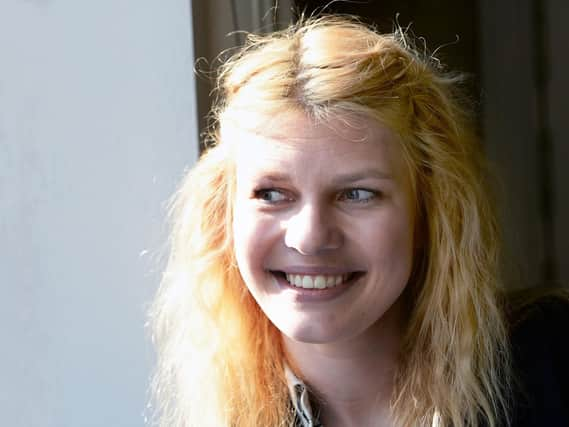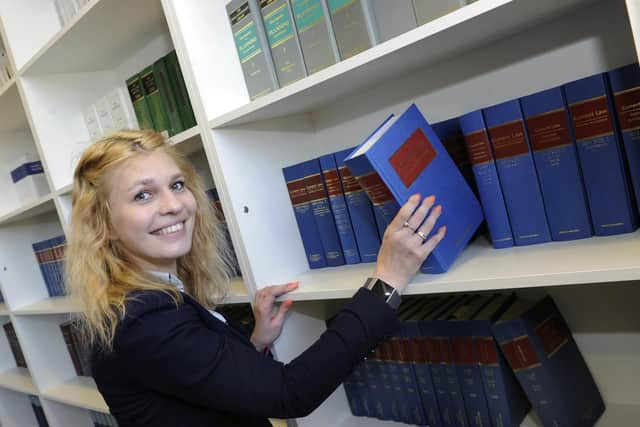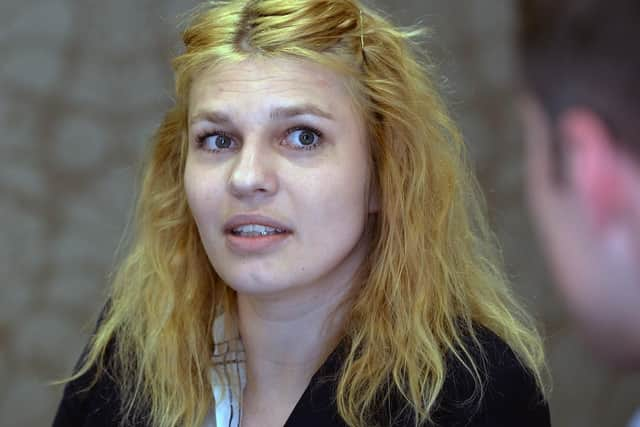Kate Riekstina: How former prison officer from Latvia became Sheffield’s youngest barrister


Born in Latvia, she was brought up single-handedly by her mother, came to the UK aged 15 and learned English by watching episodes of the suburban sitcom Keeping Up Appearances.
Called to the bar in 2016, she worked as a prison officer in tough London jails and fought off competition to become a pupil at a legal chambers in South Yorkshire, enduring multiple rejections along the way - but she doesn't seek sympathy.


Advertisement
Hide AdAdvertisement
Hide Ad"I don't want it to be all doom and gloom," she warns, having fielded questions on Brexit, legal aid cuts and the Oxbridge bias among fledgling barristers. "I love this job, I've worked so hard for this. I don't want it to be an upsetting story about how terrible the criminal justice system is. Everything in this world could be improved."
It hadn't, however, dawned on her that she was Sheffield's most youthful advocate, based at St John's Buildings on Leopold Street in the city centre.
"Oh gosh, I think I might be you know," she says, after totting up the ages of a few contemporaries. "Yeah, I am the youngest. Thankyou for pointing that out!"
Expressive and affable, she believes her career in Britain would have been impossible to replicate in Latvia.


Advertisement
Hide AdAdvertisement
Hide Ad"I play basketball – if you were good at sport, you might be able to go to America. The reason I became a lawyer was down to my teachers here who said 'You're really good at arguing'. That's how I became involved in it, I did a law competition at school. There were no law competitions in Latvia that I'm aware of. I don't think the opportunities were there when I was growing up."
Kate, who has a younger brother and sister, describes her mother, a dentist, as 'an amazing woman'.
"To start off with, money was definitely an issue because when I was born my mum was still at university. She was 20 when she had me and very quickly got divorced from my real father. She had to work her way up, which she managed. She's got three children and her own dental practice, in England. She's done incredibly well to get where she is basically on her own."
Kate doesn't 'feel great' about Britain's planned departure from the European Union.
Advertisement
Hide AdAdvertisement
Hide Ad"The only time there has been racist abuse towards my family has been since Brexit," she reflects. "It never happened, and then when the vote came in there were two incidents. In both of them, me and my family were told 'Get back to where you came from'. That felt really weird. It was hurtful, but what can you do? I'm not going to argue and say 'You must believe what I believe'. Then I'd be just as bad as they are."
She travelled to volunteer in Uganda at the end of May, and was glad the UK's EU exit date had been delayed until October. "I was really worried if Brexit happened they wouldn't let me back in."
Kate finished secondary school in Bournemouth and gained an undergraduate law degree in the seaside town. She then completed the Bar Professional Training Course at The City Law School in London. Her spell as a prison officer lasted nearly two years - she thought it would help her to stand out while applying for a pupillage, but in reality it proved something of a double-edged sword.
"Some chambers thought 'Wow, this is amazing', but others would turn their noses up at it. There was one interview specifically where I genuinely had the impression they looked down on the fact I was 'just' a prison officer. I thought 'You clearly have no understanding of what that job entails' – it's really difficult. I think maybe I lost some interviews because some chambers who have Oxbridge graduates might not appreciate that job."
Advertisement
Hide AdAdvertisement
Hide AdKate worked at Pentonville – a category B jail for male prisoners – and on the mental health unit at Holloway, the now-closed women's facility. The biggest issues at the former were confined to 'drugs, phones and fights', she says, but the latter was much more challenging emotionally.
"I was dealing with a lot of self-harm and the techniques they use in how to manage that were difficult. For example, you're told unless it's life-threatening, you shouldn't get involved, because if you do you're encouraging that behaviour by giving that person attention. Your job was to sit and watch. Communication is a lot harder because these are people who don't really understand what they're doing in prison... they shouldn't be there in the first place."
Kate doesn't think the prison regime works. "I think it's chronically underfunded, like every other part of the criminal justice system. I don't think it's a deterrent or a punishment, it's just a containment."
She suggests that, despite only being in her late 20s, her worldview is broader than many barristers'. "Your job normally ends at the time sentence is imposed. I appreciate there are appeals, and you visit clients in prison, but I don't think that's the same as being there day in, day out and seeing the really bad side of it. And the funny side as well, because there are days you laugh and it's brilliant."
Advertisement
Hide AdAdvertisement
Hide AdOn one occasion she was called into a Pentonville cell to save two fearsome prisoners from a pigeon that had fluttered in.
"These two big, muscly guys who could beat me senseless if they wanted to had run across to the other side of the landing and were screaming for help. They were like 'Miss, do anything, just get it out, it's been there all night!' They'd been in the toilet, hiding from the pigeon. I went into the cell, picked up a towel and took it out. No word of a lie, prisoners were scattering away from me as I was carrying this pigeon out of the prison. I was a hero for two weeks."
Kate was made a tenant - a self-employed practitioner - at St John's Buildings in January. As well as general criminal work, she has acted in road traffic cases, planning law matters, environmental health offences and anti-social behaviour proceedings.
"I'm proud of every case I do because I think I'm doing a job that matters," she says. "Even if there's a conviction at the end of it they can think 'That person did their best'. I think my heart lies with defence. I wanted to help people who were accused of crimes – maybe rightly, maybe wrongly. Sometimes they just need someone to listen to what they've got to say."
Advertisement
Hide AdAdvertisement
Hide AdThe 'human aspect' of criminal law is the key factor for Kate - civil work doesn't hold the same attraction.
"You deal with people from all walks of life. Every single day is different. I find it funny when people say I must hear the same stories over and over again. You don't."
She worries that avenues to justice are closing for defendants forced to represent themselves due to reductions in legal aid – "I feel sad for them" – and that the legal profession continues to be dominated by privileged types.
"It shouldn't matter whether you're from the poorest area, as long as you care about, and are good at, what you do. We need to encourage more people to apply."
Advertisement
Hide AdAdvertisement
Hide AdShe harbours ambitions to be a QC, but not a judge. "I don't want to decide whether or not I'm going to put a kid who's committed his first offence in prison. Not that I'm chickening out, I don't want to be in control of someone's life to that extent. Besides, I wouldn't send anyone to prison, and get appealed all the time."
Kate lives in Crookes, where she can often be found walking her two spaniels in Bolehill Park. She has also taken up Thai boxing – an intense way of letting off steam after days in the courtroom.
"I needed something to get me out of just working," she explains. "It's good to get frustration out."